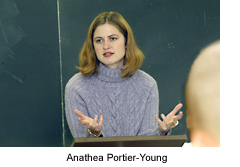
Anathea Portier-Young: Reading the Book of Daniel
By Blake Dickinson
DURHAM, NC -- To the casual observer, the persecution of Palestinian Jews by a Syrian ruler nearly 2,200 years ago has little relevance today.
The fact that the historical documents survive in Hebrew, Aramaic, Ethiopic, Greek and Latin tends only to heighten that sense of distance.
Not for Anathea Portier-Young, who joined the Duke Divinity School faculty this fall as an assistant professor of Old Testament and researched the event for her doctoral thesis.
Grasping the relevance comes not so much from the details of the persecution as it does from examining why it elicited such a variety of responses in its victims, Portier-Young explained. Some of the victims tried to assimilate into the dominant culture; others waged a campaign of non-violent resistance; a number advocated and embraced armed resistance.
Reading the relevant portions of Daniel, 1 Maccabees, 1 Enoch and the Testament of Moses "is fun for me," she said. "I'm a language nerd at heart."
But the key is "to illuminate the dynamic interrelationship between ethics, theology and the interpretation of scripture."
The exercise in hermeneutics - the effort to understand how we read, interpret and comprehend what we read - applies to current religious disputes and disagreements at home and across the globe, Portier-Young said.
"You have all these people reading the Bible in various forms, interpreting it to fit or to shape different doctrines, different programs of action," she explained. "You land in such different places depending on what your a priori commitments are."
This semester Portier-Young brings that same scholarly and theological emphasis to her Old Testament course examining the book of Daniel in its literary and historic context as a work of apocalyptic literature. She is also teaching an introductory Hebrew course.
Taking different interpretations seriously does not mean students should embrace moral relativism, stressed Portier-Young, who is on schedule to receive her doctorate this December.
"We can't afford to be unreflective or uncritical," she said. "My hope is to offer an illustration of how different people striving to be faithful can arrive at such different ethical programs."
Portier-Young, who was named after a Judy Collins folk song, didn't plan on becoming a theologian while growing up in Emmitsburg, Md. Her father is a theologian and has "a very strong personality," she said. "I had it in my mind that I was going to do something very different than my father."
She studied English and French at Yale University before settling on classical languages and literature, graduating in 1995 with Phi Beta Kappa honors. Uncertain about her future, she had many talks with professors, attended lectures, visited campuses and spent a semester studying classics at the University of Pennsylvania.
Her epiphany came when reading The Revelatory Text: Interpreting the New Testament as Sacred Scripture by Sandra Marie Schneiders. Embracing hermeneutics and the study of Scripture as her calling, Portier-Young enrolled in the Graduate Theological Union/Jesuit School of Theology at Berkeley, Calif., receiving her master of arts in biblical languages in 1998.
Portier-Young met her husband, Stephen Young, while working on the Outer Banks during college. Anathea waited tables while Stephen worked as a chef. They dated on and off, worked together for several summers, got engaged and moved to California to attend separate graduate schools.
They married in 1997. Their son Sebastian was born in 2000, two years after Portier-Young entered the Ph.D. program in Duke Divinity School.
"He is the light of our lives," Portier-Young said. "Being a mom has changed my life in amazing ways."
While her husband's love for the ocean and surfing played a role in Portier-Young's decision on a doctoral program, the strong reputation and faculty of Duke's Graduate Program in Religion was the ultimate draw. When a faculty position at Duke Divinity School opened up five years later, Portier-Young wasn't sure if she was ready, but applied.
"There was just this very natural fit," she said. "I can't imagine being in a better place."
Divinity School Dean L. Gregory Jones agreed.
"Thea combines a superb academic background, a passionate engagement with her field, and a creative engagement with interdisciplinary concerns," he said. "She has high expectations for her teaching and for students' engagement with texts and issues.
"In addition, as a Roman Catholic she adds a rich perspective both to our faculty and to the Divinity School community. We look forward to her leadership in our faculty with great expectation."
An example of that leadership came during Portier-Young's student days. As a Catholic, she was in a distinct minority in the divinity school. To create a space for conscious reflection on issues of Catholic identity and the Catholic intellectual and spiritual life, she helped found Catholics at Duke Divinity School. They invited faculty and students from the divinity school and religion department to listen to speakers and engage in roundtable discussions.
"We wanted to create a community," Portier-Young explained.





